#as someone who admittedly ignored the aforementioned realities and is trying to learn more about them after watching the show bc it opened
Explore tagged Tumblr posts
Text
I do think people who work in the field should roast the show because it was supposed to bring attention to some kind of realities that get ignored more often than everything else and it became a soap opera instead but consider. I like it.
#no ok listen i have thoughtstm#as someone who admittedly ignored the aforementioned realities and is trying to learn more about them after watching the show bc it opened#my eyes#you have no idea how difficult it is to find information about juvenile prisons#it is difficult enough for normal prisons but juvanile ones? it's like they don't exist#and they have so many fucking problems#so many#every time i try to explain what i found out i get mad#jesus christ they're kids and no one cares about them#and i hoped the show would do the same thing to other people as it did to me ie open their eyes about those problems#(I'm not saying it's realistic. it's just a rai fiction after all they didn't even have money to make s1 come on but it made me say 'let's#see how things really are' and then i got mad about it bc i thought they were better and they're not)#it didn't#the kids keep being ignored. the problems are still there. people literally cross the street in front of jails as if the 'unworthyness'#could be passed to them through osmosis or something#they could do so much with this fame and success and money they're making#but they do nothing and this scary because the original aim was to raise awareness not romanticize#s1 was very clear on this aspect it was horrible and crude it wanted to say hey kids. these dynamics are bad and will get you killed#now it's very different#and i get why organizations are mad#but i still think that if what happened to me happened to a few other people than the show worked and I'm grateful for it#i do have names of organisations if anyone is interested#and I'll write an article on the actual situation one day
4 notes
·
View notes
Text
re: kacchako is bad (responses)
oh my god I'm going to answer all of these in one post because it’s been a freaking long day and i have no desire to answer each individual permutation of the same sentiments over and over again
read more this time bc it didn’t seem clear enough last time by the bolded ‘kacchako is bad title’ that you can scroll past if you’re sensitive to criticism because this is a criticism of kacchako.
Concern:
Don’t tag it in the ship tag if it’s hate! Just blacklist it if it bothers you so much. People can ship it if they want, don’t be mean/an asshole! :(
Answer:
I can't believe I'm getting "let people ship what they want don't spread hate it's never worth it" msgs in this year of our lord 2017. Don't moralize down to me about spreading hate and quit acting as if I went into people’s inboxes to harass and specifically be mean to them. I used the tag, yes, but I did it to bring kacchako fans’ attention to legitimate concerns I have about the ship’s consequences, and I made my opinion very explicit in the bolded title of the post so people can scroll past if they’re sensitive. I thought it was worth the risk to my sanity to make sure that people who aren't as sensitive to criticism won’t just ignore that there are important issues with kacchako because it’s easier, or because they just don’t know/never thought about it. (I’m now partially feeling it wasn’t worth it, but determined to stand by my points)
Concern:
I think kacchako is fine and I don’t defend abuse! I just imagine them in a place where Bakugou is grown up and not abusive anymore and Ochako doesn’t take that shit!
Answer:
It has occurred to me that it’s rarely anyone’s intention to support abuse, which is why I bothered to write the original post at all. To reiterate my argument so I don’t get confused ‘kacchako is not abusive’s in my inbox, I’m not saying that kacchako is inherently abusive. I’m saying that as Izuku’s friend, Ochako wouldn’t be motivated to date Bakugou specifically because he bullies Izuku and has abusive tendencies towards her friend, and because she’s someone who cares about Izuku’s wellbeing she wouldn’t be interested in someone who continues to unapologetically treat Izuku like that.
There is no ‘she secretly likes Bakugou’ right now, or vice versa. She just wants to catch up to Izuku. And Bakugou does not respect her more than he sees her as a threat.



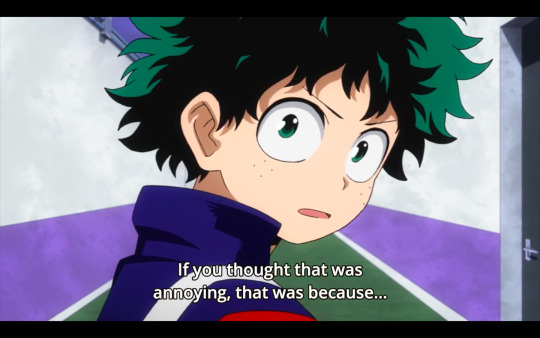

To the reimagining future Bakugou part: again, I doubt anyone has the intention to erase Izuku’s experience as a victim of Bakugou’s bullying. I’m saying that no one writes Bakugou changing from a bully into a better person respectfully or realistically. Most interpret Bakugou’s one interaction with Ochako (in which he considers her a legitimate threat to beat) as an indicator of Bakugou beginning to change because of Ochako, even if after this interaction he’s still only interested in winning and dominating over others and if people are potentially in his way.
Let me give you a definition of domestic abuse (my bolding):
"domestic abuse occurs whenever one person in an intimate relationship or marriage tries to dominate and control the other person. Domestic violence and abuse are used for one purpose and one purpose only: to gain and maintain total control over you. An abuser doesn’t ‘play fair.’ Abusers use fear, guilt, shame, and intimidation to wear you down and keep you under his or her thumb. Your abuser may also threaten you, hurt you, or hurt those around you.”
All kacchako shippers imagine a future Bakugou as someone who automatically deserves forgiveness for not being an asshole anymore, most likely due to Ochako keeping him in line, and not a single one has been able to describe, in informed detail, about how hard it is to change abusive behavior.
“In discussing why abusers abuse, it’s clear that a lot of the causal factors behind these behaviors are learned attitudes and feelings of entitlement and privilege — which can be extremely difficult to truly change. [...] While we hope abusive partners will change, it’s not always realistic to expect that they can and will. Focus on changes you can control to improve your own life, because you deserved to feel loved, happy and safe.”
Signs of progress of changing abusive behavior include (some bolded for what I think kacchako shippers particularly don’t take into account often when characterizing future Bakugou):
Admitting fully to what they have done
Stopping excuses and blaming
Making amends
Accepting responsibility and recognizing that abuse is a choice
Identifying patterns of controlling behavior they use
Identifying the attitudes that drive their abuse
Accepting that overcoming abusiveness is a decades-long process — not declaring themselves “cured”
Not demanding credit for improvements they’ve made
Not treating improvements as vouchers to be spent on occasional acts of abuse (ex. “I haven’t done anything like this in a long time, so it’s not a big deal)
Developing respectful, kind, supportive behaviors
Carrying their weight and sharing power
Changing how they respond to their partner’s (or former partner’s) anger and grievances
Changing how they act in heated conflicts
Accepting the consequences of their actions (including not feeling sorry for themselves about the consequences, and not blaming their partner or children for them)
Making Bakugou an adult does not change that you need to write him checking his abusive behavior.
Concern:
But Bakugou has changed at this point in the manga---he and Izuku now have an understanding of trust and respect.
Answer:
Bakugou has only demonstrated one instance that he could be changing. Though change for Bakugou is a good and decidedly difficult feat, one instance does not an abusive pattern break.
Let me direct you to the classic cycle of abuse by psychologist Lenore Walker, with helpful manga caps from Ch. 117-121:
1) Tension building phase
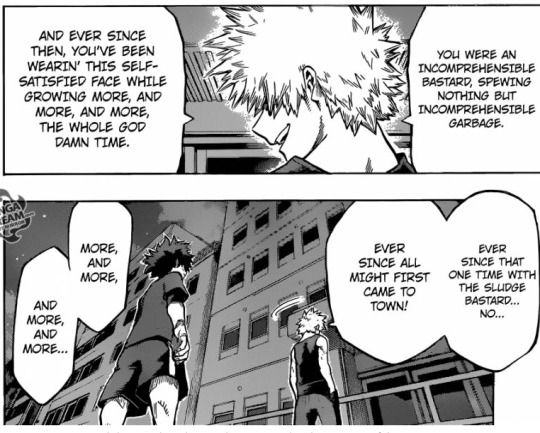
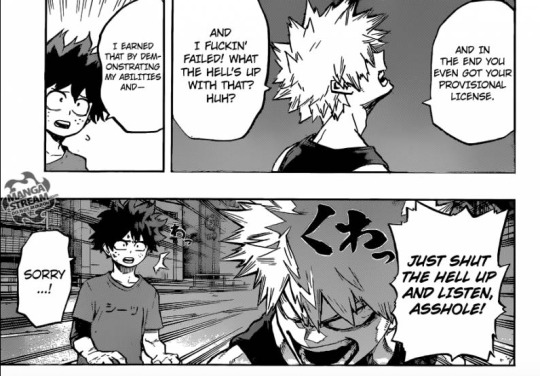
2) Acute battering phase (in which Izuku absolutely does not want to fight at first until he feels obligated to)


3) Honeymoon phase
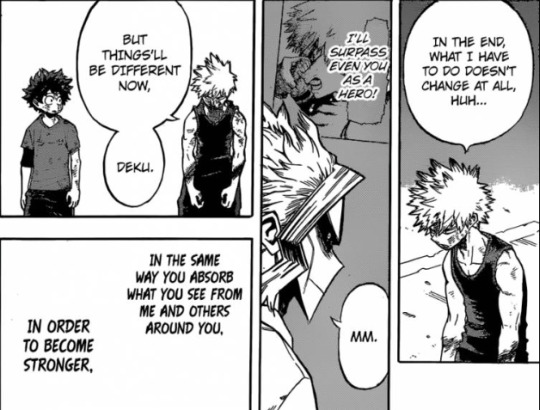

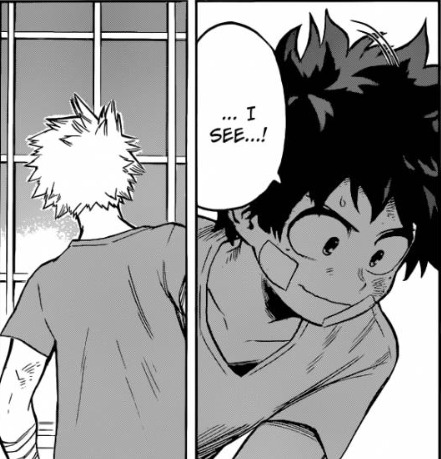
“The abuse may be terrible, but the promises and generosity of the honeymoon phase give the victim the false belief that everything will be all right.”
Secondly, to the aforementioned abuse-changing bullets Bakugou has not achieved up to after he’s fought with Izuku Ch. 117-121:
Admitting fully to what they have done
Accepting responsibility and recognizing that abuse is a choice
Accepting that overcoming abusiveness is a decades-long process — not declaring themselves “cured”
Thirdly, to what he is beginning to do
Stopping excuses and blaming
Carrying their weight and sharing power
I concede that Bakugou is making steps towards change because he is a hardheaded egoistic teenager who up to this point hadn’t offered help out of his own volition. But if you’re taking this as a sign that he’s anywhere near lasting and permanent change, even years from now---I almost literally just wrote a foot of text and references as to why that isn’t realistic or respectful towards the realities of abusive behavior. Please realize you are likely oversimplifying his path towards change.
Concern:
Not all kacchako shippers are like that! I know (insert fanworks here) that are respectful, good, etc,
Answer:
Show me. I’m more than willing to take a look and then give you my detailed opinion afterwards, if you’d like.
Concern:
I’m not trying to force a het agenda, I just like the dynamic.
Answer:
I mentioned before that people may not realize their intentions don’t match up with consequences. I just wrote more than 2 hours worth explaining why kacchako doesn’t have a sensical basis for a good relationship and am considering just passing out on the spot right at this moment in sheer exhaustion. I’m just going to post screenshots that actually do have the aforementioned good qualities and ask politely that you consider these respective Ochako and Katsuki ships, instead of kacchako het, which endorses a contrived relationship over not straight ones that actually have a basis of mutual affection in canon:





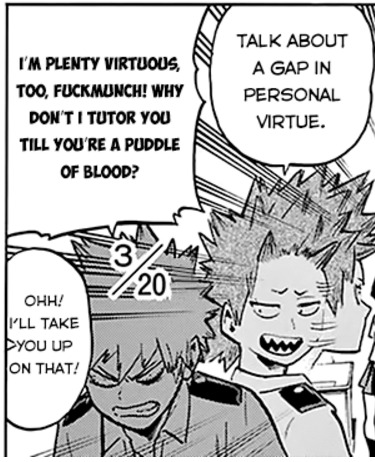

Fuck, if you really really want to ship Uraraka with a guy Iida and/or Midoriya have plenty of shared affection and solid relationships with her, I trust you don’t need me to screen cap to know that.
Concern:
If Bakugou is so problematic, wouldn’t any ship with him be problematic (including kiribaku)?
Answer:
Finally a good question. I would say yes and no. Yes, because if you’re a survivor of abuse it’s perfectly valid and understandable not to want to think about Bakugou and his potential romantic partners at all. No, for a variety of reasons, using kiribaku as an example:
a) Bakugou and Kirishima are established friends with a relatively healthy, mutual relationship. Bakugou has a foul temper but he’s not abusive towards Kirishima, even going out of his way to---admittedly badly---help him study (above caps from the manga and light novel); Kirishima admires Bakugou, finds positive qualities in their friendship, and isn’t cowed, wary, or disgusted by him, like Ochako or Izuku and many others are. tl;dr, there is plenty of solid evidence to back up the mutual affection, respect, and trust between them, something that kacchako and---god forbid---bakudeku lack.
It’s actually good for Bakugou to learn how to develop uncontrolling behaviors through healthy relationships where he doesn't feel the need to dominate over his partner. He can’t do this with Ochako, with whom he regards as nonexistent at best, and a threat to him as Izuku’s lackey at worst (I discussed this in detail further up). Referring back to the changing abusive behavior list, Bakugou’s relationship with Kirishima demonstrates that Bakugou can learn a) respectful, kind, supportive behaviors and b) carrying weight and sharing power. This doesn’t justify how Bakugou treats others, but it does facilitate a view of how Bakugou would be able to treat others better, which I think is worth exploring.
Concern:
Why do you care so much? People ship bad/problematic stuff all the time lol there’s nothing you can do to stop it. Just let it be or blacklist it or something??
Answer:
I’m maybe foolishly invested in the idea that some people don’t have to be like that when they’re informed and engaged in critical discourse, and well fuck I have time and resources and have already started two godamned things this weekend with fandom out of probably masochistic impulses, so why the fuck not.
Just because I don’t like something doesn’t mean I’m here to attack people or be unwilling to talk to them about it---rather, I’m more concerned that people are so unwillingly to talk about why the things they like isn’t good??
Kacchako is just one instance. I can provide a lot more examples of this kind of behavior in different areas of interest, in detail, with plenty of support and reasons, over private message. Otherwise, I’m not interested in making a detailed -post- of examples of bad kacchakos because honestly, I’ve already spent a lot of my time writing this when I could be discussing more pressing issues. The downsides of hyper focus.
On that note, forgive me if I don’t immediately respond to further replies any time soon after this post. After more than 10 messages that entirely missed the point I’ve exhausted myself thinking people could put aside their first impulses and self-indulgences to maybe formulate better opinions on tumblr.com, rather than sending me vague, misinformed, and/or childishly defensive insults that don’t actually tell me I’m wrong.
#bnha#kacchako#abuse mention /#long post#super fucking long#any more replies will be directed to this post unless theres actually something new for someone to tell me#13 pages of irritation and hyper focus and meticulous attention to detail
31 notes
·
View notes